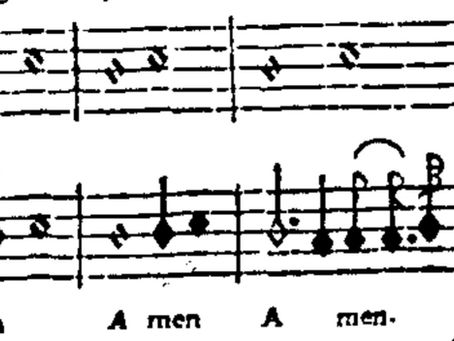top of page
Reimagining Historical Voices
Search


Gioseffo Zarlino on Those who Improvise Counterpoint with ‘No Regard for the Other Voices’ (1558)
‘What Must be Observed when Improvising a Third Part on Two Given Parts: Skilled contrapuntists occasionally want to improvise a third...

Tim Braithwaite


An Anonymous Set of Instructions for Ornamenting Plainchant (c.1475-1525)
[fol. 22r.] Chapter two: of the definition and the division of melodía Melodía is to adorn and to grace the sounds of plainchant. Melodía...

Tim Braithwaite


Dr. Zechariah Buck’s (1798-1879) Methods of Teaching Choristers at Norwich Cathedral
The time table of daily duty was, 9 to 9.45, scale practice; 10 to 11, morning service; 11 to 12.30 or 1, music practice; 2 to 3.45,...

Tim Braithwaite


Bovicelli on the Graceful Placement of Certain Syllables (1594):
‘As for the disposition of the words under the notes, it is necessary to take great care to set them so well, that not only no barbarism...

Tim Braithwaite


The ‘Tedious’ Tempo of English Psalm Singing in the Early 18th Century
‘But the greatest Difficulty is to sound every Note according to its due Measure of Time; and here it is that the Singers in most Country...

Tim Braithwaite


Bottrigari on both Ensemble Ornamentation and ‘Odious’ (‘odiosa’) Improvised Counterpoint (1594)
‘[Alemanno Benelli:] But because of the presumptuous audacity of performers who try to invent passaggi, I will not say sometimes, but...

Tim Braithwaite


Andreas Ornithoparcus (1516) on Solmisation:
(Summary) The Rules of Solfaing When solfaing, the singer must be aware of the mode of the piece, since this will tell them what sort of...

Tim Braithwaite


Conrad von Zabern on those who Deviate from Notated Plainchant Melodies (1474):
‘To sing with fidelity... is to sing so that anyone of those singing together should remain in the form of those notes that were...

Tim Braithwaite


Thomas Morley on the Perils of Many Singers ‘Singing on a Plainsong.’
'As for singing upon a plainsong, it has been in times past in England, as every man knows, and is at this day in other places, the...

Tim Braithwaite


Jean-Jacques Rousseau’s Definition of Chant sur le Livre:
‘Singing on the book. A Plainchant or counterpoint in four parts, which the musicians compose and sing impromptu on a single [part]:...

Tim Braithwaite


Coclico on Learning how to Improvise on a Plainchant (1552):
'Having learned these species [of intervals] and the method, here is how we ought to use them. The boy should provide himself with a...

Tim Braithwaite


English Psalm Singers ‘Tearing with their Throats one Wretched Stave into an Hundred Notes’: (1708)
‘Then out the People yawl an hundred Parts, Some roar, some whine, some creak like the Wheels of Carts; Such Notes the Gam-ut yet did...

Tim Braithwaite


The Practices of ‘Lascivious’ Church Musicians as Described by Heinrich von Nettesheim (1532)
‘Today, music has such great license in churches that even along with the canon of the mass certain obscene little ditties sometimes have...

Tim Braithwaite


Roger Freitas on Modern Representations of Historical Singing:
‘To many in the singing profession, in fact, an investigation of past approaches seems irrelevant. Even a casual survey of recent...

Tim Braithwaite


Adrianus Petit Coclico on the Art of Singing as (Supposedly) Taught by Josquin Dez Prez (1552):
‘To teach the art of singing well and elegantly to a boy, I advise first that he choose a teacher who sings pleasantly and sweetly with a...

Tim Braithwaite


Manuel Garcia on the use of Sobbing and an Annotated Recitative from Rossini’s Otello:
'The fragment of recitative [below] has two effects. By the words, “Io credeva che alcuno,” Desdemona expresses the depression that...

Tim Braithwaite


Johann Samuel Petri’s Advice for Teaching a Congregation to Harmonise a Chorale Extempore (1767)
Question. How can one remedy the fault that a choir, when it sings a well-known church chorale without sheet music, as must often happen,...

Tim Braithwaite


Manuel Garcia on Changing or Replacing Words when Singing:
In altering or re-arranging words, or syllables, care should be taken to retain and mark the measure or accent of a melody, and only...

Tim Braithwaite


Giovanni Battista Martini on Singing ‘all’improvviso’ on a Cantus Firmus (1774):
'Among the compositions made above a cantus firmus by the masters of the art, those [made] above introits are unique, and are used...

Tim Braithwaite


Banchieri on Writing an Introit that Creates the Effect of Improvised Counterpoint in Many Voices
‘I have no doubt at all that the counterpoints above a cantus firmus from the introits by Constanzo Porta and Giovanni Matteo Asola,...

Tim Braithwaite
bottom of page
